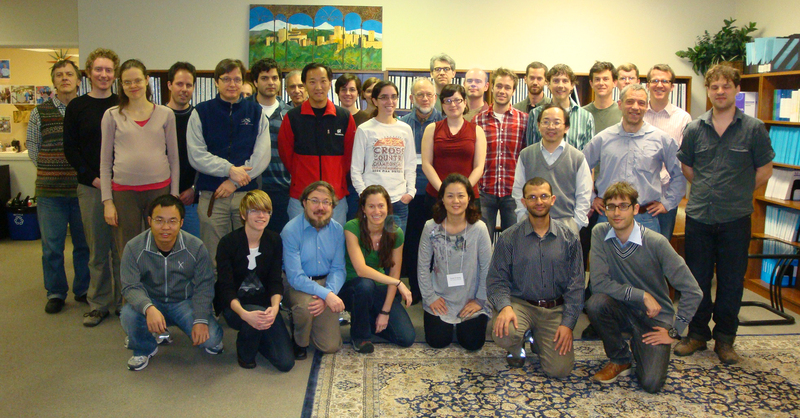Mock modular forms in combinatorics and arithmetic geometry
March 8 to March 12, 2010
at the
American Institute of Mathematics,
San Jose, California
organized by
Kathrin Bringmann,
Ken Ono,
and Sander Zwegers
Original Announcement
This workshop will focus on mock modular forms as they occur in combinatorics and arithmetic geometry and explore some other potential applications.
In recent years there has been a flurry of activity in the area of mock modular forms. Despite the recent rapid development, many open problems and further applications still need to be addressed. The primary goal of this workshop is to focus on some of the different
areas of mathematics and physics that could benefit from the many recent advances in the subject.
Below is a partial list of topics to be discussed during the workshop. The participants are more than welcome to suggest related topics of their interest.
- Modularity of q-series:
Although lots of examples exist of q-hypergeometric series that behave nicely under modular transformations (modular forms, mock modular forms, etc.), there is no general theory that can help you determine if a particular q-series is (mock) modular or not. We hope to get a better understanding of the relations between q-hypergeometric series and automorphic forms.
- Higher depth modular forms:
The class of mock modular forms, being an extension of the class of classical modular forms, can be extended further to so called higher depth mock modular forms to obtain a graded ring. Furthermore, this seems to be the appropriate setting to understand certain theta functions associated to indefinite quadratic forms and other functions with near modular properties, like the quasi-modular forms and quasi-mock modular forms. We hope to get a better understanding of these functions, and how they show up in combinatorics and related areas.
- Applications of mock modular forms:
Recent works have shown that mock modular forms appear as a type
of generating function for derivatives of twisted modular L-functions.
Mock modular forms have also appeared in connection with the representation
theory of affine Lie superalgebras. We shall work to obtain a more precise
relationship between derivatives of elliptic curve L-functions and
the coefficients of mock modular forms, and we shall work to compute
the asymptotic dimensions of characters of Kac and Wakimoto.
Material from the workshop
A list of participants.
The workshop schedule.
A report on the workshop activities.
Papers arising from the workshop:
l-adic properties of the partition function
by Amanda Folsom, Zachary A. Kent, and Ken Ono
The partition function and Hecke operators
by Ken Ono,
Adv. Math. 228 (2011), no. 1, 527-534 MR2822238Algebraic formulas for the coefficients of half-integral weight harmonic weak Maass forms
by Jan Hendrik Bruinier and Ken Ono,
Adv. Math. 246 (2013), 198-219 MR3091805CM values of automorphic Green functions on orthogonal groups over totally real fields
by Jan H. Bruinier and Tonghai Yang
Mock modular forms as p-adic modular forms
by Kathrin Bringmann, Pavel Guerzhoy, and Ben Kane
Eichler-Shimora theory for mock modular forms
by Kathrin Bringmann, Pavel Guerzhoy, Zachary Kent, and Ken Ono

